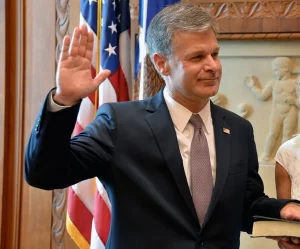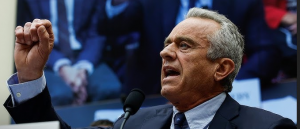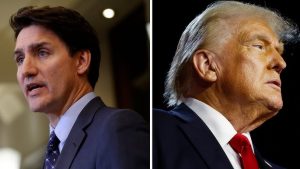The resignation of FBI Director Christopher Wray comes amidst significant political pressure, particularly from President Donald Trump, highlighting the challenges of maintaining agency integrity in a polarized environment.**
Resignation of FBI Director Christopher Wray Sparks Political Debate**

Resignation of FBI Director Christopher Wray Sparks Political Debate**
Wray’s unexpected resignation raises questions about the future direction of the FBI under the influence of a transitioning political landscape.**
The unexpected resignation of FBI Director Christopher Wray on Wednesday marks a significant development in the bureau's leadership, occurring just seven years into his typically ten-year term. This early departure is perceived as catalyzed by immense pressure from various political quarters, predominantly from President Donald Trump, as the inauguration of President-elect Trump approaches.
In response to Wray's resignation, President Trump hailed the event as a "great day for America," indicative of the divergent political narratives surrounding the FBI's leadership transitions. Meanwhile, Wray underscored his dedication to the FBI and its workforce in his farewell statement, expressing how challenging the decision had been for him. "This is not easy for me," he declared, highlighting the intensive emotional weight of stepping down in such a charged political atmosphere.
Sources suggest Wray faced a stark ultimatum: to resign voluntarily or be terminated amidst a backdrop of rising tensions and scrutiny surrounding the Bureau. This potential forced resignation not only underscores the pressures inherent in the appointment but raises critical questions regarding the implications for the FBI at a time when the agency's independence has come under fire.
Wray's term was characterized by a series of contentious investigations that drew ire from various political factions. He consistently advocated for a neutral Bureau, striving to insulate it from political influence while concentrating on public safety and national security. His resignation thus signals a pivotal moment, both reflecting internal dilemmas within the FBI and the external demands faced from the political realm.
The impending nomination of Kash Patel as Wray’s successor is anticipated to introduce a sharper alignment with the priorities of the outgoing administration. Patel, formerly a senior figure under Trump, is recognized for his unwavering endorsement of Trump's policies. This transition could drastically reshape the FBI’s strategic focus in upcoming years.
The future direction of the FBI, particularly in light of Wray's exit and Patel's projected ascendance, will carry lasting ramifications for how the agency addresses law enforcement and political interplay. As the FBI prepares for a transformative phase, its enduring mission of safeguarding the country amidst the evolving political narrative remains paramount.
In response to Wray's resignation, President Trump hailed the event as a "great day for America," indicative of the divergent political narratives surrounding the FBI's leadership transitions. Meanwhile, Wray underscored his dedication to the FBI and its workforce in his farewell statement, expressing how challenging the decision had been for him. "This is not easy for me," he declared, highlighting the intensive emotional weight of stepping down in such a charged political atmosphere.
Sources suggest Wray faced a stark ultimatum: to resign voluntarily or be terminated amidst a backdrop of rising tensions and scrutiny surrounding the Bureau. This potential forced resignation not only underscores the pressures inherent in the appointment but raises critical questions regarding the implications for the FBI at a time when the agency's independence has come under fire.
Wray's term was characterized by a series of contentious investigations that drew ire from various political factions. He consistently advocated for a neutral Bureau, striving to insulate it from political influence while concentrating on public safety and national security. His resignation thus signals a pivotal moment, both reflecting internal dilemmas within the FBI and the external demands faced from the political realm.
The impending nomination of Kash Patel as Wray’s successor is anticipated to introduce a sharper alignment with the priorities of the outgoing administration. Patel, formerly a senior figure under Trump, is recognized for his unwavering endorsement of Trump's policies. This transition could drastically reshape the FBI’s strategic focus in upcoming years.
The future direction of the FBI, particularly in light of Wray's exit and Patel's projected ascendance, will carry lasting ramifications for how the agency addresses law enforcement and political interplay. As the FBI prepares for a transformative phase, its enduring mission of safeguarding the country amidst the evolving political narrative remains paramount.




















